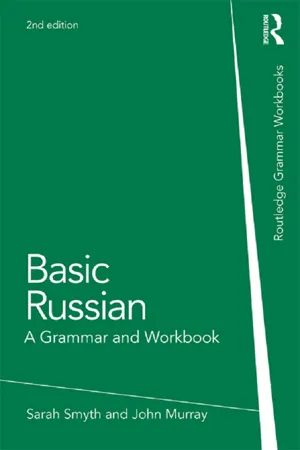
eBook - ePub
Basic Russian
A Grammar and Workbook
John Murray, Sarah Smyth
This is a test
- 384 pages
- English
- ePUB (adapté aux mobiles)
- Disponible sur iOS et Android
eBook - ePub
Basic Russian
A Grammar and Workbook
John Murray, Sarah Smyth
Détails du livre
Aperçu du livre
Table des matières
Citations
À propos de ce livre
Designed for students with a basic knowledge of Russian, this book provides an accessible reference grammar and related exercises in a single volume.
Across more than forty grammar topics it introduces the student to Russian people and culture through the medium of the language used today, covering the core material which the student would expect to encounter in their first year of learning Russian.
Complete with a full key to exercises and glossary, Basic Russian is a user-friendly reference grammar suitable for both independent study and class use.
Foire aux questions
Comment puis-je résilier mon abonnement ?
Il vous suffit de vous rendre dans la section compte dans paramètres et de cliquer sur « Résilier l’abonnement ». C’est aussi simple que cela ! Une fois que vous aurez résilié votre abonnement, il restera actif pour le reste de la période pour laquelle vous avez payé. Découvrez-en plus ici.
Puis-je / comment puis-je télécharger des livres ?
Pour le moment, tous nos livres en format ePub adaptés aux mobiles peuvent être téléchargés via l’application. La plupart de nos PDF sont également disponibles en téléchargement et les autres seront téléchargeables très prochainement. Découvrez-en plus ici.
Quelle est la différence entre les formules tarifaires ?
Les deux abonnements vous donnent un accès complet à la bibliothèque et à toutes les fonctionnalités de Perlego. Les seules différences sont les tarifs ainsi que la période d’abonnement : avec l’abonnement annuel, vous économiserez environ 30 % par rapport à 12 mois d’abonnement mensuel.
Qu’est-ce que Perlego ?
Nous sommes un service d’abonnement à des ouvrages universitaires en ligne, où vous pouvez accéder à toute une bibliothèque pour un prix inférieur à celui d’un seul livre par mois. Avec plus d’un million de livres sur plus de 1 000 sujets, nous avons ce qu’il vous faut ! Découvrez-en plus ici.
Prenez-vous en charge la synthèse vocale ?
Recherchez le symbole Écouter sur votre prochain livre pour voir si vous pouvez l’écouter. L’outil Écouter lit le texte à haute voix pour vous, en surlignant le passage qui est en cours de lecture. Vous pouvez le mettre sur pause, l’accélérer ou le ralentir. Découvrez-en plus ici.
Est-ce que Basic Russian est un PDF/ePUB en ligne ?
Oui, vous pouvez accéder à Basic Russian par John Murray, Sarah Smyth en format PDF et/ou ePUB ainsi qu’à d’autres livres populaires dans Languages & Linguistics et Languages. Nous disposons de plus d’un million d’ouvrages à découvrir dans notre catalogue.
Informations
PART 1
Identifying and describing people, places and objects
UNIT 1
Identifying people
Gender
(i) Nouns are classified in Russian according to three genders: masculine, feminine and neuter. The grammatical gender of a noun, which is constant, can usually be identified by its ending in the nominative case, that is, the dictionary form of the noun. In this unit we concentrate on nouns that refer to people. These are usually masculine or feminine nouns. Masculine nouns refer to men, feminine nouns to women. (See Unit 3 for nouns referencing objects and places and for the introduction of neuter nouns.)
Masculine nouns end in a consonant, a consonant followed by a soft sign (-ь) or a vowel followed by the semi-consonant (-й).
hard | consonant | музыкант | Иван |
soft | consonant + -ь | писатель | Игорь |
soft | vowel + -й | герой | Николай |
Feminine nouns end in -a, -я, -ия or -ь. Note that the ending -ь may indicate either a masculine or feminine noun.
hard | consonant + -a | балерина | Анна |
soft | consonant + -я | Катя | |
soft | consonant + -ь | Любовь | |
soft | consonant + -ия | Анастасия |
(ii) Generally speaking males are designated by masculine nouns and females by feminine nouns.
Note: There are, however, some nouns ending in -a or -я which designate males. These nouns, though they look like feminine nouns, are grammatically speaking masculine, e.g., мужчина ‘man’, дядя ‘uncle’, дедушка ‘grandfather’; a number of first names, such as Илья, Никита, Фома; and many affectionate forms of names, such as Kоля(short for Николай), Ваня (short for Иван) and Петя(short for Пётр). These nouns are qualified by masculine adjectives, e.g. хороший мужчина ‘a good man’ (see Unit 4).
‘Hard’ and ‘soft’ endings
As can be seen from the tables above some nouns have what are called ‘hard’ endings and others ‘soft’ endings. The categories of ‘hard’ and ‘soft’ refer to the quality of the final consonant as realised in the vowel that follows it.
‘Hard’ endings are represented in the written language by a consonant followed by:
• a zero ending (no ending) which in some grammar books is represented as Ø
• or one of the following vowels: -а, -у, -ы or -o
‘Soft’ endings are represented in the written language by a consonant followed by:
• a soft sign: -ь
• or one of the following vowels: -я, -ю, -и, -ё or -е
This distinction is easy to remember once you realise that Russian has two renditions of every...
Table des matières
Normes de citation pour Basic Russian
APA 6 Citation
Murray, J., & Smyth, S. (2013). Basic Russian (2nd ed.). Taylor and Francis. Retrieved from https://www.perlego.com/book/1615083/basic-russian-a-grammar-and-workbook-pdf (Original work published 2013)
Chicago Citation
Murray, John, and Sarah Smyth. (2013) 2013. Basic Russian. 2nd ed. Taylor and Francis. https://www.perlego.com/book/1615083/basic-russian-a-grammar-and-workbook-pdf.
Harvard Citation
Murray, J. and Smyth, S. (2013) Basic Russian. 2nd edn. Taylor and Francis. Available at: https://www.perlego.com/book/1615083/basic-russian-a-grammar-and-workbook-pdf (Accessed: 14 October 2022).
MLA 7 Citation
Murray, John, and Sarah Smyth. Basic Russian. 2nd ed. Taylor and Francis, 2013. Web. 14 Oct. 2022.